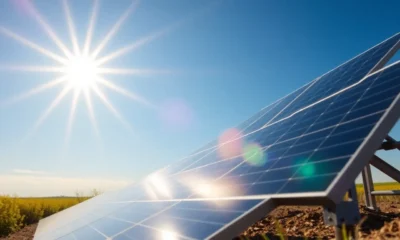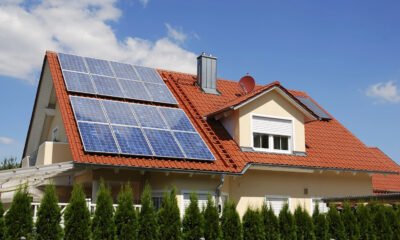

Energy
5 Ways You Can Use Technology to Become a More Environmentally-Conscious Consumer
Technology is often seen as part of the problem when it comes to climate change, and it’s not hard to see why with recent reports showing that the majority of our electronic waste ends up in landfills in developing nations rather than being recycled.
But since technology isn’t going anywhere, it’s important that we find ways to make it part of the solution too, and there are countless apps and gadgets that can help us shop more sustainably, conserve energy at home and minimize our carbon footprint.
Not sure where to get started? Here’s a quick look at some of the most effective ways technology can help you become a more environmentally-conscious consumer.
1. Shop with green apps
One effective way to reduce your carbon footprint is to make more environmentally-friendly purchases, and thanks to all the ‘green’ apps that are being developed these days, it’s becoming a lot easier to figure out which products have the lowest impact on the environment.
For instance, you can find apps that help you to locate farmer’s markets and sustainable eateries in your area, apps that let you scan a product’s barcode to check for carcinogens or toxins and even apps that tell you how and where you can dispose of household items and electronics responsibly.
3. Invest in a few smart power strips
Leaving larger electronics like Televisions, DVD players or computers on standby or plugged in when you’re not using them can use up a surprising amount of energy, especially if you’re leaving a lot of appliances on standby 24/7 throughout your home.
According to the U.S. Department of Energy, the average U.S. household spends around $1,900 on energy each year, and between 5% and 10% of that is used by appliances that are left plugged in unnecessarily.
This is where smart power strips can help, because rather than having to unplug each appliance after use, a smart power strip automatically cuts the power when an appliance goes into standby mode.
3. Install a smart thermostat
Little slips of the mind like forgetting to turn off the heating or air-conditioning when you leave the house can waste a lot of energy, which is why using a smart thermostat can help you conserve energy without even really thinking about it.
Some smart thermostats will monitor your usual habits, such as when you normally leave for work, when you come home or when you go to sleep, and will then be automatically programmed to fit your lifestyle. Others may simply allow you to control the temperature in your home remotely or program a weekly schedule in advance.
4. Use solar energy whenever possible
Even if powering your home entirely with solar energy is too expensive for you at this moment in time, you may be able to switch some of your appliances or electronic devices to solar energy and still make a big difference to the environment.
For instance, research shows that by 2019, the greenhouse gases produced by smartphone charging will be on par with the yearly emissions of 1.1 million cars, so even just investing in a portable solar battery charger for your smartphones and tablets can help.
If you want to start using more solar energy around the home, check out this infographic for examples of innovative gadgets that allow you to harness the sun’s power, including solar backpacks, solar-powered sound systems and solar generators.
5. Use an energy-management system
Unless you’re tracking your energy usage, it will be difficult to get a clear picture of how much energy you’re using, where and when it’s being used and what sort of changes you might make to cut down on your energy consumption.
With this in mind, it’s a good idea to use an energy-management system. There are numerous apps that can provide you with a clear overview of your household’s energy consumption and allow you to track it in real-time from your phone, but some energy providers have started providing this service, so check with your energy provider or consider switching to one that offers free energy-monitoring.
Marianne Stenger is a writer with Open Colleges. She covers everything from career development to life hacks and sustainable living. You can connect with her on Google+ and Twitter or find her latest articles here.


 Environment12 months ago
Environment12 months agoAre Polymer Banknotes: an Eco-Friendly Trend or a Groundswell?

 Features11 months ago
Features11 months agoEco-Friendly Cryptocurrencies: Sustainable Investment Choices

 Features12 months ago
Features12 months agoEco-Friendly Crypto Traders Must Find the Right Exchange

 Energy11 months ago
Energy11 months agoThe Growing Role of Solar Panels in Ireland’s Energy Future





























